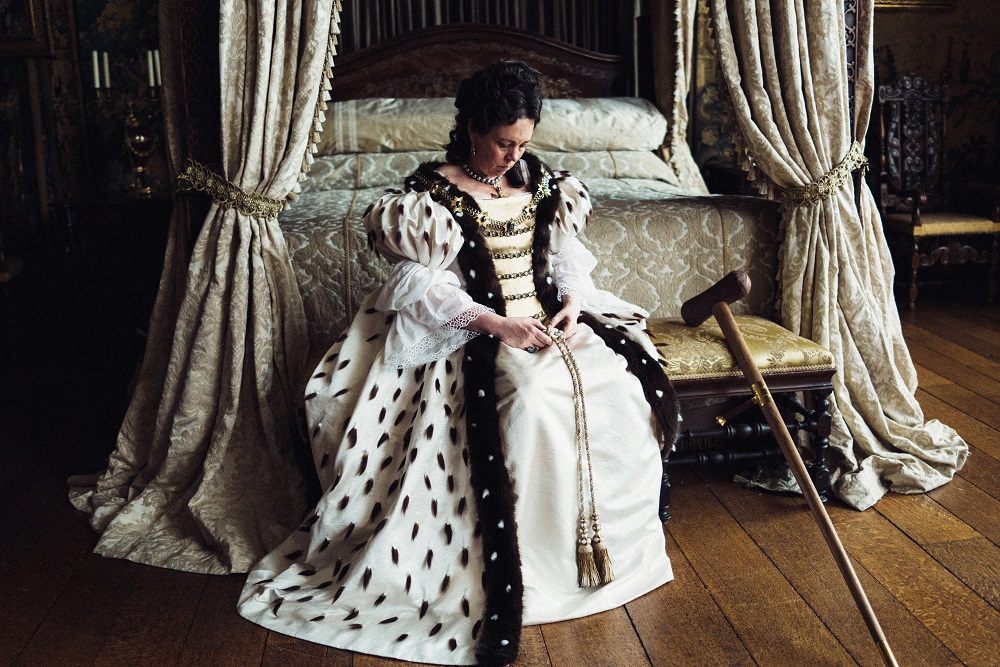CHICAGO – In anticipation of the scariest week of the year, HollywoodChicago.com launches its 2024 Movie Gifts series, which will suggest DVDs and collections for holiday giving.
A Hilarious Combination of Crass and Class in ‘The Favourite’
 Rating: 4.5/5.0 |
CHICAGO – Looking through auteur Yorgos Lanthimos’ filmography, you’ll recognize a style that combines both visual beauty and narrative absurdism. The Lanthimos effect, or Lanthimo-nium as I like to call it, elevates any piece of work to such a high degree that often times the meanings go over our heads. In his most mainstream effort to date, “The Favourite” will likely become your favorite of his works.
This time around, Lanthimos uses the early 18th century as his playground as he explores the later years of England’s Queen Anne (Olivia Colman), which were filled with war, scandal, and decadence. It is well-documented that Queen Anne had an interest in the fairer sex, keeping close confidantes like Sarah Churchill (Rachel Weisz) and Abigail Masham (Emma Stone). Anne was known for having a myriad of health, and possibly mental health, problems, all exacerbated by the typical sense of entitlement that royalty tends to feel. There have been so many period dramas about the aristocracy that, at face value at least, “The Favourite” seems like it might just be another droll affair. Instead, Lanthimos plays the film out like a “Real Housewives” reality show, complete with “Jerry Springer”-style bouts. “Regal Housewives” if you will.

Photo credit: 20th Century Fox
In the perfect marriage between crass and class, the film offers up the expected visual opulence of Victorian architecture and aristocracy with a tone that mirrors our current society. Not only does this seemingly odd combination prove to be a refreshing take, but it also makes the film palatable to the average audience; something most of Lanthimos’ past films have failed to do. Although the film focuses on the monarch of an entire country, Lanthimos directs the film with an affected, agoraphobic intimacy that is as beautiful as it is devastating. In a film that easily passes the Bechdel test, “The Favourite” never veers far from its female focus, making sure that in this time period overwhelmed by patriarchy, we know that the entire country was ruled/controlled by women.
Lanthimos makes sure that the only important point of view that needs to be focused on is the female gaze. The characters exude sex, power, and passion, but at no point are they depicted as anything other than human. This is made wonderfully clear with how naturally the sexual aspects of the film are handled. At no point is there ever any ostentation when dealing with the lesbian love triangle that takes place in the film. It is treated the way every film should treat sexuality—as just another inherent part of being human. The focus is on the way these women weaponize their sexuality as a means to an end, and it just so happens that their target is a female. Lanthimos shows us every part of our characters—the good, the bad and the ugly—and never tokenizes or fetishizes them.

Photo credit: 20th Century Fox
Aside from Lanthimos’ deft directing, “The Favourite” benefits a lot from a woman’s touch, and that comes in the form of writer Deborah Davis. Alongside co-writer Tony McNamara, Davis drives this female-centered story with genuine bonds of friendship and romance. The ease in which these relationships develop and bloom on-screen is one of the greatest joys in the film because of how sincere they come off. No matter how complex the emotion, every character’s motivations, and true feelings are made clear. Feelings of lust, betrayal and irreconcilable loss flow throughout the film, many introduced subtly or through blatant humor. This is the first film in almost two decades that Lanthimos didn’t also have a hand in writing, but it is precisely this that makes it one of his most effective. The comedic elements shine through, creating robust laughs that are obviously intentional, unlike some of his past films where the absurd moments made it difficult to decipher if the humor was purposeful or accidental.
The comedic timing, in combination with the Shakespearean prose-like way of speaking, gives many of the film’s heavier moments much-needed levity, but the serious topics round the film out. Sex politics plays a huge role, but the exploration of grief and depression makes the exploration of Anne’s character all the more compelling. Anne lost 17 children and died without leaving an heir. In the film, for every child she lost, she had a rabbit with the name she would have given them. For someone like Anne, who was plagued with ill-health and loss, rabbits became the perfect personification of her grief because, in her life, tragedies bred like rabbits.

Photo credit: 20th Century Fox
Every character is complex and fully fleshed out, which wouldn’t have been possible without a stellar cast to bring these historical figures back to life. Olivia Colman reigns the film as Queen Anne, giving a depth to her character that is easily a result of her many years of experience. The nuance Colman delivers is signature to any role she plays, but this one is possibly her best to date. Without the command of her character, Rachel Weisz and Emma Stone would not have anyone to play off of. It is hard to imagine a more perfect trio for a dramedy, and without the three of them being in perfect, balanced harmony, “The Favourite” would easily have lost my favor.
 | By JON ESPINO |


